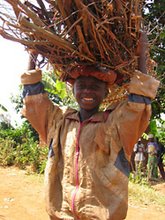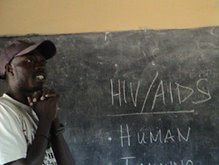Day 5: Sunday, February 11, 2007
I woke this morning with a pounding headache. After grabbing a quick breakfast, I felt better, and I spent the rest of the morning continuing to read Dallaire’s account of the Rwandan genocide. Several times I had to put the book down and close my eyes as I felt like I could hear the screams of despair of all those who were murdered and all those who were left behind. I’ve done some meditating and praying to manage all of my emotions.
Many of the Rwandans that I've met so far returned home to Rwanda after the genocide from exile in neighboring countries such as Burundi, Uganda, Democratic Republic of the Congo, etc. I've met a few people in their twenties who lived through the ordeal. I can’t imagine how they see the world? Can you ever really go back to leading a routine life after living through Hell?
I also attended several meetings and held informal discussions with colleagues from around the world who are also attending the Friends of the Global Fund in Africa inauguration. Masaki from Japan, Svetlana from Ukraine, and Francoise from Rwanda were some of the civil-society colleagues with whom I networked. I also met with the staff of the Global Fund secretariat and some of the VIPs, including the Ministers of Health from Rwanda and Ethiopia, and the former President of Nigeria, General Gowon. General Gowon was President of Nigeria during the Biafra Civil War in the late 1960s, which could have divided the country, but he was able to keep the federation together, so he is sort of like Nigeria's Abraham Lincoln.
During the afternoon, I went with Svetlana to visit the Kigali Memorial Centre on the Genocide. The memorial is on the site of the mass graves of 256,000 people who were slaughtered in Kigali, the capital of Rwanda. I was shocked when I walked down past a dozen large concrete burial slabs to find that the last concrete slab was left partially open, so that you can actually see wooden coffins holding thousands of remains. The exhibits inside the memorial were very moving, especially the Children’s Memorial Hall, which included personal histories of about a dozen children who were lost. The memorial also had a large exhibit hall on other modern genocides, including the European holocaust, the Cambodian massacre, and the Bosnian crisis.
The most horrific thing I learned was that many victims of the Rwandan genocide had run into their churches for sanctuary. But even there they were not safe. In Nyange, 2,000 congregants were sheltering in their church when Father Seromba gave the order to bulldoze the church. Countless victims were tortured, raped, and forced to watch their loved ones murdered.
I also learned about the amazing efforts of resistance and how many Rwandans reached across tribal lines to save one other from death. Amidst the horror, there are many stories of grace and salvation as well.
This experience has me questioning and examining my own relationship with spirituality and God. How could people of faith be so abandoned? Could I keep my faith in God if I were faced with this kind of unimaginable horror in my own life?
I was inspired to learn from the Rwandan Minister of State in charge of HIV/AIDS about the innovative efforts under way to manage the post-traumatic stress disorder affecting so many people. He told me that April (the month when the genocide began) is a particularly hard time when many people get severely depressed. The Rwandan government has established a national network of community-based counselors and community-based tribunals called "gacacas" (meaning justice on the grass), where perpetrators are brought to justice and reconciliation and forgiveness can occur.
Rwandans are so hopeful about the progress they are making, and it is indeed inspiring to see their brilliant minds and bodies working together to repair and rebuild their families and country. But we have to face the fact that genocide is still happening, for example, in Darfur, Sudan. And the potential for genocidal violence in many other places remains all too real. Can we find a way to create a new 21st century humanity where we can truly commit to "never again" allow another genocide? I think we should try!
Sunday, February 11, 2007
Subscribe to:
Post Comments (Atom)






4 comments:
Hi Paul,
Thanks for sharing your journey to Rwanda with us - so striking, honest and though provoking. It also reminds us how privileged we are to be alive.
Why rest of the world keeps going at its normal pace when humanity in one corner is suffering so much- like in Darfur.
Thanks once again to take us to Rwanda on your voyage of insight and questioning!
Best,
Vineeta
Thanks for this interesting and inspiring blog.
I'm curious if you know of any literature about the acts of resistance and acts of kindness that crossed tribal lines during the genocide that you mentioned? Are there books or other publications that focus on this?
Best of luck with the remainder of your journey and I look forward to reading about it!
Best,
Leah
There are many instances recorded of acts of heroism by Church people either to protect those who were hunted or else who gave their lives in the place of others. A lot of good people from the Churches, both Protestant and Catholic took tremendous risks to hide Tutsis and Hutus. Many lay people were involved in such acts, but sisters and priests too protected and gave their lives for people of other ethnic groups. Paul, you should ask around in Church circles and you will hear the stories. The Rwandan government doesn't give the full story as they have many bones to pick with the Church, which, when it is at its most faithful, points out the truth. That is something the Rwandan government is not always comfortable with.
Dear Vineeta, Leah, and Phil:
Much thanks for your comments. Leah, I wasn't able to visit Jo'berg on this trip, so I don't know about the AIDS Museum, but they sound interesting. Let's connect when I get back to the USA.
Phil, As you can tell this is my first trip to Rwanda, so I wouldn't begin to think I that I could understand all of the dynamics of the past and now. I'm eager to learn more about the resistance fighters, including those in the church! please send me any information on that you have.
Post a Comment